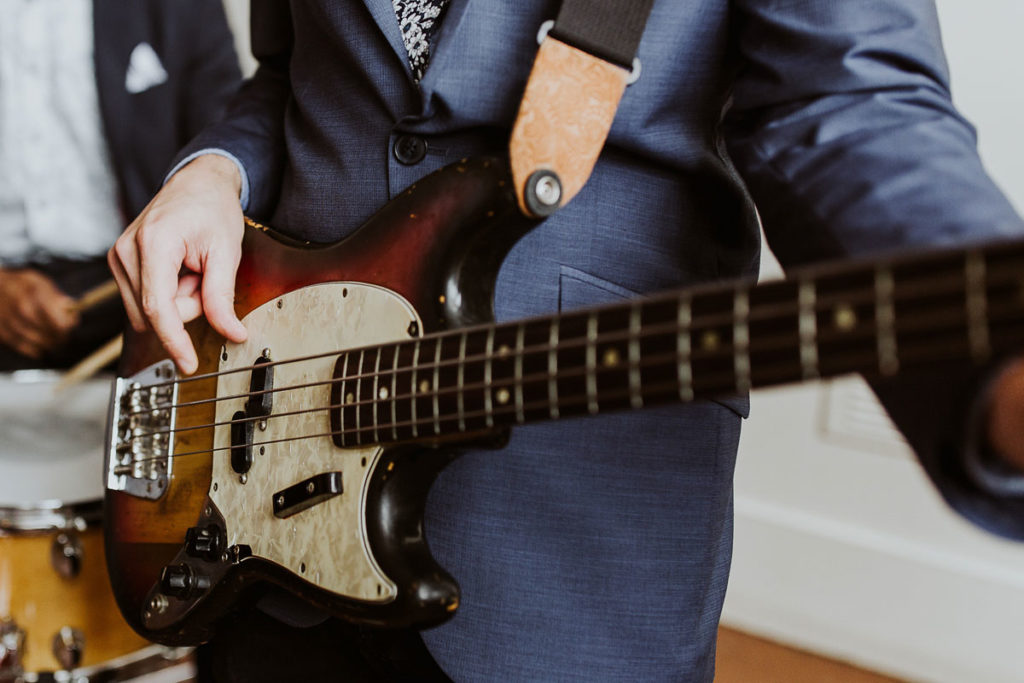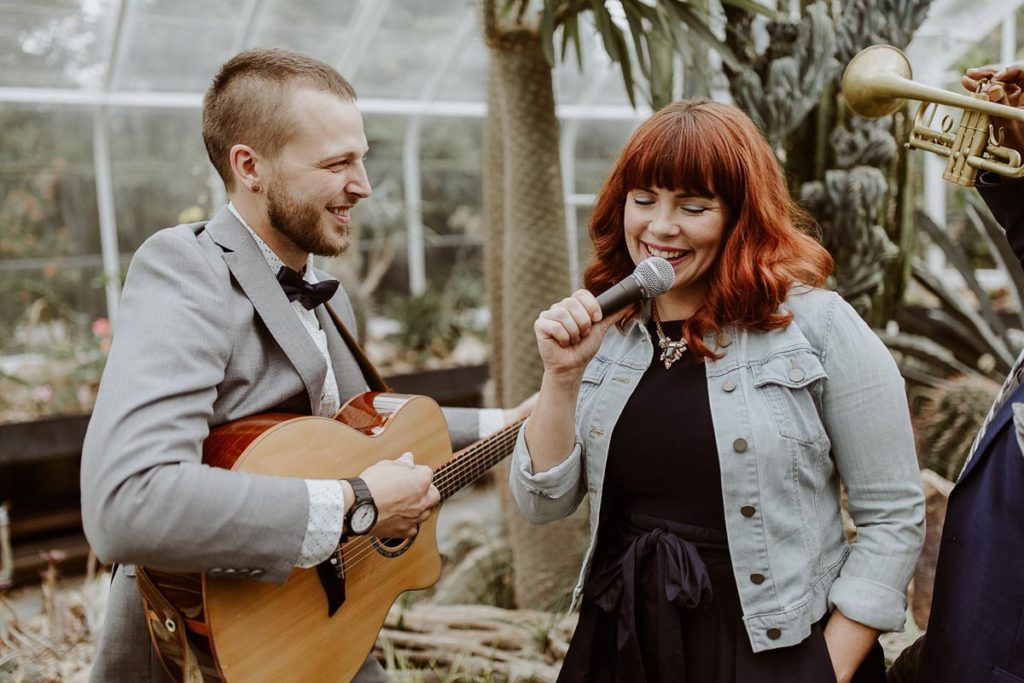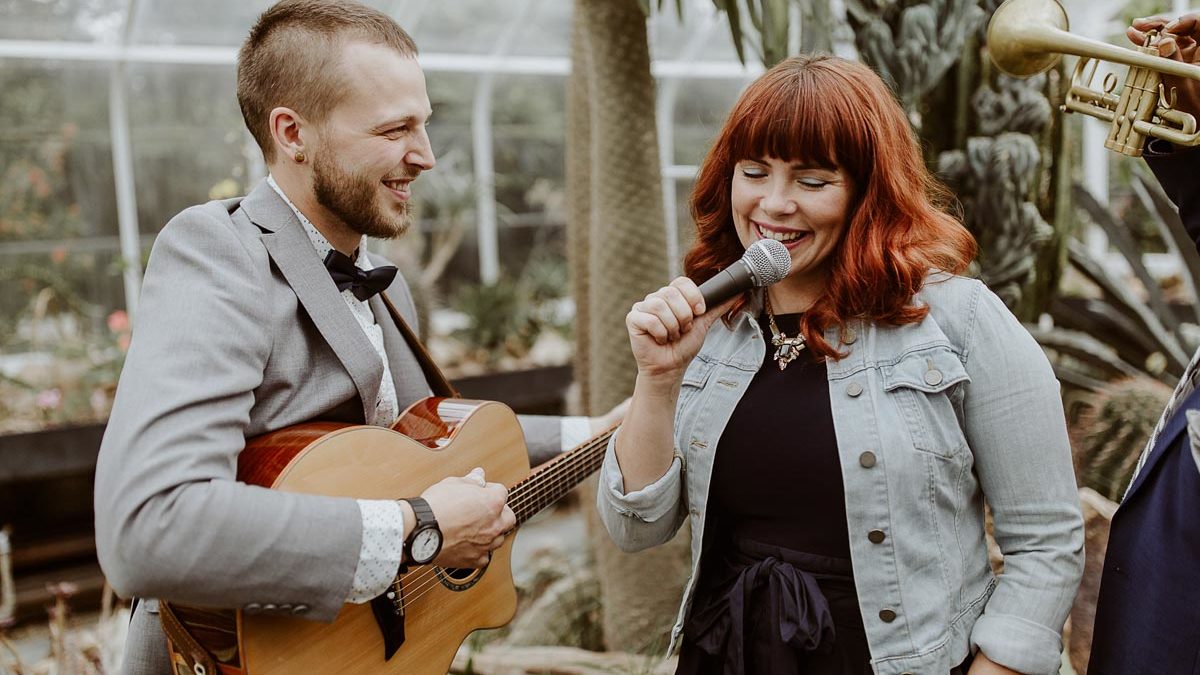Planning your wedding music can be fun or a major challenge, depending on your personality. But keep in mind that music is such an important aspect of your wedding. It adds a vibration, a hum, a rhythm to every moment of the day, whether it’s a slow and romantic ballad or the sashay of feet waltzing all over the dance floor late into the night to classic songs. Music creates the flow of the party and serves as a memory keeper. Years from now, when you hear songs from your ceremony and reception, you’ll be transported back to your magical wedding day, hearing the soundtrack of your love story that brought your celebration to life.
Flow is essential for a fabulous wedding that will have your guests’ cheeks flushed with excitement. You’ll want to welcome guests to your ceremony space with an upbeat but measured music choice. Similarly, when you invite your guests to enter your reception space when the doors open, you’ll want them to be caught up in the wonder and delight of it all, from the decor, to the glass of wine they’re greeted with, to the immediate welcome notes of music in their ears.

Ceremony music can be provided by a plethora of potential talented sources. Many couples go for mainly instrumental beats, but some enjoy singers as well. Orchestral ensembles, guitarists, saxophonists, trombone players, or bagpipe players—the aural opportunities are endless.
Love Note:
Your idea of what a particular piece of music should sound like might be different than what the DJ or musician has in mind. You might find that your favorite song presented in an a cappella version versus a purely instrumental version wrecks the moment. Make sure your wishes match up with your musicians’ plans. One way to confirm you’re on the same page is to send YouTube videos or links to a music directory of each song.
For your reception music, decide if you want to have a live band, hire a DJ, or take a DIY approach courtesy of a friend and an iPod. The rich sound and spontaneous vibe of live bands make for a more interactive experience. The bandleader can adjust the tempo of the evening with different sets, from jazzy cocktail music to upbeat dance tunes. Of course, live bands usually require a larger financial investment, and the band you hire might have only one or two styles of music in its repertoire. A DJ offers more variety and, unlike a cover band, can provide the original artists singing the hits. Either way, hire your musicians well in advance. The coveted ones are booked eight to twelve months out.
If you’re considering going DIY for your wedding music, the people you appoint to operate the music can make or break your sound system. Make sure you have a trusted friend or family member in charge, someone you can count on, so you’re not sweating bullets the entire night during the transitions instead of enjoying your wedding.
Before you book anyone, though, understand the lineup of your wedding. Whether you’re reciting your vows at city hall and having a reception back at your house, holding the ceremony and reception at a posh downtown hotel, or having a destination wedding in Maui, music is almost always incorporated into the traditional course of events as outlined in the next two sections.
Search for local LGBTQ+ friendly wedding vendors.
Ceremony music
1 / The prelude
The music that plays when your wedding guests are being seated, either by escort or on their own.
2 / The processional
The music begins as the parents or most important people to the couple are seated. Then, if one partner is going to be waiting at the front of the ceremony space with attendants for the other partner and their attendants, they will enter at this time and take their place at the front with the officiant. Next, the remaining attendants of the wedding party. The ring bearer and the flower child are last before the couple or the remaining partner.
Suggestions for processional music
“Canon in D Major”, (Pachelbel)
“All of You”, (John Legend)
“I Was Married” by Tegan and Sara
“Air on the G String,” Bach
“A Thousand Years” by Christina Perri
“Hallelujah” by Jeff Buckley
“La Vie en Rose” by Andrea Bocelli
3 / The interlude
Musical interludes are a nice way to add symbolic meaning to rituals, such as lighting the unity candle, a sand ceremony or signing the ketubah.
Suggestions for music, depending on the ritual:
“Ave Maria” (Johann S. Bach/Charles Gounod)
“Hoppípolla” by Sigur Rós
“The Water Is Wide” (James Taylor)
“Reverie” (Claude Debussy)
4 / The recessional
When everything is over and you’ve sealed everything with a kiss, you’re deliriously happy and it’s time to go celebrate. There’s still order to maintain though. Everyone walks out in the order in which they came—except the guests, even family. They wait, with huge grins on their faces.
First to walk out is the happy couple, followed by the adults in the wedding party. Usually the officiant will take that time to make an announcement about where to go for the cocktail party (you know, the important news). Then everyone will disperse while you go have your portraits done or whatever you’ve decided to do in this exciting time. Congrats, you are married!
Suggestions for recessional music
“Best Day of My Life” (American Authors)
“Ode to Joy” (Beethoven)
“Signed, sealed, delivered” (Stevie Wonder)
“You Make My Dreams Come True” (Hall & Oates)
5 / The postlude
This is a continuation of music as the guests make their way out of the ceremony space. It can be more of the same joyous music played as you walked out to or some softer but still upbeat tunes.

Reception music
Let your personality be your guidepost here, but most of your guests are coming for a full celebration of your marriage. And music is a true catalyst for this. Whether you hire an orchestra, band, a DJ or a singer, or do it yourself with an iPod and speakers, your music sets the tone for the event. And even though budget, decorations, theme and personality is what your reception hinges on the most, so does your event time.
Daytime receptions
If your wedding reception is taking place before dinner, cocktails and lunch may certainly be served and music most definitely can be played. But depending on the temperament of your guests and style of your wedding, a daytime wedding generally calls for softer music so that conversations are the focus, rather than dancing.
EVENING WEDDINGS
Cocktail hour
While guests are mingling in this first hour, the couple and the wedding party are often gone taking their official wedding portraits. Because the focus is on conversation, the music should be lighter. If you had a string musician for the ceremony, consider having them stay on and keep playing for this additional time. They might even have had a minimum time that you need to meet—or have one or two of your reception musicians come early and play light but lively jazz for this time period. Instruct them to play instrumental music only though, as it allows people focus on conversations amongst themselves, not the stage.
Dinner and dancing
Flow is essential for a fabulous wedding that will have your wedding guests’ cheeks flushed with thrill. Think in advance how you’d like the flow of your wedding. In general, people will be invited to enter your reception space when the doors open and you’ll want them to be to caught up in in a daze of wow of awe of wonder and delight, from the décor to the sights of greetings of wine and immediate welcome notes of music in their ears. The music plays an enormous part in this package, so think carefully who you’ll want on your team. If you’re going DIY—make sure it’s still a trusted friend or family member who can be counted on for everything so you’re not sweating bullets the entire night for transitions instead of enjoying your wedding. Hire your musicians well in advance. The coveted ones are booked eight to 12 months out.
Excerpted from Equally Wed: The Ultimate Guide to Planning Your LGBTQ+ Wedding by Kirsten Palladino (Seal Press)

































